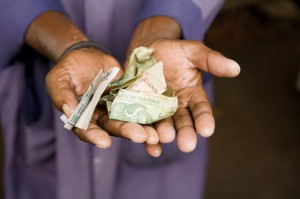Adaptation Fund
Good harvest in bad times: despite successful projects, the Adaptation Fund is facing a financial drought in the long run
Shortly before the end of the climate conference in Lima, Germany was applauded enthusiastically for its pledge of €50 million to the Adaptation Fund (AF) – an even higher amount than Germany’s commitment last year. This earned the fund’s largest donor great praise: the Ray of the Day – a civil-society award for climate action at the conference.
Once again, Germany made a significant contribution toward ensuring that the fund can continue its vital and successful work in the year to come. The following examples illustrate the AF’s ability to carry out projects effectively.
Senegal forges ahead: A measure to address coastal erosion in Senegal was initiated in 2011 as the AF’s first direct-access project. It has since been completed successfully, sending a strong signal for the AF. The project, which was conducted by the Senegalese national implementation entity (NIE) Centre de Suivi Ecologique, clearly demonstrates the positive impact of NIEs. Closely following the objectives of Senegal’s national adaptation plan for action, the project strengthened self-reliance and self-determination at the national and municipal levels and created capacities of expertise from an institutional perspective.
Blazing new trails in South Africa: The frequently-described concept of enhanced direct access, which shifts decision-making on projects away from the AF board and toward national actors, is currently being tested in South Africa. The $2.4 million Community Adaptation Small Grants Facility (SGF) approved by the AF just a few months ago is expected to achieve great things: Within the next four years, twelve to sixteen small grants projects in two regions of South Africa are to be funded with up to $100,000 to finance adaptation measures in the fields of agriculture, climate-appropriate infrastructure and building climate-resilient livelihoods for various population groups.
Adaptation goes urban in Honduras: The adaptation project in Honduras was the first to be approved by the AF in its brief history. Unlike many other projects in the AF portfolio, the project in Tegucigalpa does not focus on rural communities, but on the most vulnerable urban dwellers, in this case by improving infrastructure in the Honduran capital and nearby communities in the Choluteca river basin. Rainwater harvesting systems were installed and 46 weather observation stations were set up in Tegucigalpa. The numerous workshops held in the country created a climate of cooperation between all stakeholders that is presently bearing fruit in the project implementation.
Thanks to the German pledge, three of the four projects that the AF had approved some time ago but was unable to fund can now be realized immediately. Nevertheless, the fund’s financial foundation remains shaky, as the €50 million only represents about three quarters of this year’s fundraising goal. It is now up to the governments of other countries to follow the German lead and contribute at least the remaining amount of roughly €15 million. For a lasting success story, however, a more sustainable solution for the Adaptation Fund is urgently needed.
Lisa Junghans and David Eckstein, Germanwatch





